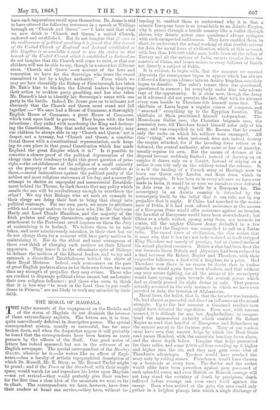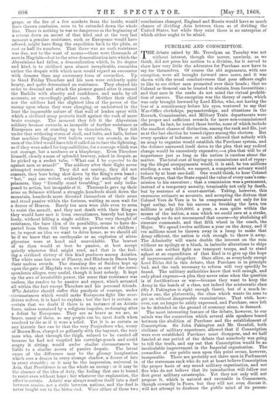THE MORAL OF MAGDALA.
THE fuller accounts of the engagement on the Bashilo and of the storm of Magdala do not diminish the interest of those extraordinary exploits. The letters are, it is true, quite marvellously deficient in descriptive power. The special correspondent system, usually so successful, has for once broken down, and when the despatches appear it will probably be found that the correspondents have been beaten as mere penmen by the officers of the Staff. One good series of letters has indeed appeared, but not in the columns of an English newspaper. The special correspondent of the Bombay Gazette, whoever he is,—he writes like an officer of Engi- neers,—has a faculty of artistic topographical description of which Dr. Russell, Mr. E. Dicey, or Mr. Bayard Taylor might be proud ; and if the Times or the Standard, with their ample space, would watch for and reproduce his letter upon Magdala —not yet arrived—they would probably give their readers for the first time a clear idea of the mountain we went so far to climb. The correspondents we have, however, have done their readers at home one service,—they have, without in- tending it, enabled them to understand why it is that a minute European force is so formidable to an Asiatic Empire,
why it passes through a hostile country like a bullet through cheese, why Asiatic power once questioned always collapses with such unexpected suddenness. They have enabled them, in short, to understand the actual working of that terrible solvent for Asia, the moral force of civilization, which at this moment, with less than 100,000 white men, holds down all the tribes of Tartary and all the nations of India, extorts treaties from the masters of China, and issues orders to every follower of Boodh not directly a subject of Pekin.
It is evident, to begin with, that the moment we entered Abyssinia the consequence began to appear which has always followed a European advance into an Asiatic kingdom,—society began to dissolve. The ruler's tenure then was questioned, questioned in earnest ; let everybody under him take advan- tage of the opportunity. It is clear now, though the Army as it advanced did not perceive the fact, that with its advance every man hostile to Theodore felt himself more free. The chieftain of Lasta began a regular course of conquest, and " annexed " everything up to the Egyptian frontier. The chieftain of Shoo, proclaimed himself independent. The Mussulman Gallas rose, the Christian brigands rose, the peasantry rose, till Theodore found himself ruler only of his army, and was compelled to tell Mr. Rassam that he owned only the rocks on which his soldiers were encamped. All this " rising," even when universal, does not, indeed, destroy the empire attacked, for if the invading force retires or is defeated, the central authority, after more or less of anarchy, usually regains its own. But the means of defence at its disposal become suddenly limited ; instead of drawing on an empire it draws only on a district, instead of relying on a nation it can rely only on the soldiery round the colours. It is as if the landing of a French army at Hastings were to leave our Queen only London and Kent from which to gather strength. It has been so in every advance we have ever made in India, it would be so were we ourselves ever defeated in Asia even in a single battle by a European foe. The sovereignty in an Asiatic country is defended by the sovereignty itself, by the belief that it can rule, not by any prejudice that it ought. If China had marched to the assist- ance of Pekin, if it had even offered assistance as the masses of a European State would offer assistance against an invader, the handful of Europeans would have been overwhelmed ; but China as a whole waited, sprang away from, not towards its centre, till the mighty Chinese Army dwindled to a few brigades, and the Emperor was compelled to call on a Tartar tribe. The moral force of civilization, the dim notion that it must win, that it is a fate not to be resisted, of itself stripped King Theodore not. merely of prestige, but of three-fourths of his actual physical resources. Before a shot had been fired the war between Great Britain and Abyssinia had been reduced to a duel between Sir Robert Napier and Theodore, with their respective followers, a duel with a kingdom for a prize. Had Theodore won there is no reason to doubt that in twelve months he would again have been absolute, and that without any very severe fighting, for all the atoms of his sovereignty would have sprung again towards the central power which had so clearly proved its right divine to rule. That process actually occurred in the only instance in which we have ever receded in Asia, the invasion of Afghanistan.
Moral force, the belief, that is, that the invader was irresisti- ble, had almost as powerful and direct an influence on the actual struggle. Up to the last moment a thousand resolute men might have defeated the expedition. Even now, with success assured, it is difficult for any but Anglo-Indians to compre- hend the measureless audacity which enabled Sir Robert Napier to send that handful of Europeans and Beloochees up the narrow ascent to the fortress gate. Many of our readers must have seen that narrow ledge by which the Mont Cenis road passes Mondovi, with the mountain bending down above, and the sheer depth below. Imagine that ledge protracted for three miles, and some 2,000 soldiers crawling up it higher and higher into the air, and they may gain some idea of Theodore's advantages. Tyrolese would have crushed the army only by rolling stones. Frenchmen would have thrown up a barricade at every turn. The Snider and the rocket would alike have been powerless against men possessed of such splendid cover, and even British or Belooch courage will not long stand the certainty of death by precipices, death inflicted before courage can even exert itself against the enemy. Even when arrived at the gate, the men could only gather in a helpless plump, into which a single discharge of
grape, or the fire of a few muskets from the inside, would have thrown confusion, soon to be extended down the whole line. There is nothing in war so dangerous as the beginning of a retreat down an ascent of that kind, and at the very last moment a genuine resistance, such as Europeans would have offered, might have flung the expedition back to the plain, or cost us half its numbers. That there was no such resistance was due, not to the want of means—there were thousands of men in Magdala—but to the utter demoralization into which the Abyssinians had fallen, a demoralization which, in its degree and kind, is to civilized men almost inexplicable, resembles rather the despair with which men would regard an encounter with demons than any customary form of cowardice. Up to Good Friday Theodore and his men were evidently quite hearty, and quite determined on resistance. They obeyed his order to descend and attack the pioneer guard after it crossed the Bashilo with alacrity and confidence, and made, by all accounts, an exceedingly gallant rush. Neither their chief nor the soldiers had the slightest idea of the power of the enemy upon whom they were charging, or understood in the least the impassable nature of that wall of leaden spray with which a civilized army protects itself against the rush of mere brute courage. The moment they felt it the Abyssinian soldiery became cowards, as incapable of further resistance as Europeans are of standing up to thunderbolts. They felt under that withering storm of shell, and bolts, and balls, before that machine flinging 900 bullets every ten seconds, as the men of the 33rd would have felt if called on to face the lightning, as if they were asked for impossibilities, for a courage which was .not courage, but a madness or a blasphemy. Even Theodore himself, clearly a man of splendid bravery, asked in despair, as he picked up a rocket tube, "What can I be expected to do against men so armed?" The soldiery after their flight never attempted resistance. They did not mutiny, they did not censure, they bore being shot down by the King's own hand ; "but," says one writer, evidently on the authority of the prisoners, they "literally stood trembling," not only indis- posed to action, but incapable of it. Thousands gave up their arms on Selassee without a struggle, hundreds slunk down the mountain, hundreds more divested themselves of their arms and stood passive within the fortress, waiting as men wait for a decree of Heaven. Barely ten men were able even to seem to resist the assault, and they met death with their King as they would have met it from executioners, bravely but hope- lessly, without killing a single soldier. The very thought of resistance, the bare idea of its possibility, seems to have de- parted from them till they were as powerless as children ; or, to repeat an idea we want to drive home, as we should all be if we knew that an earthquake or an explosion of nitro- glycerine were at hand and unavoidable. The bravest of us then would at best be passive, at best accept quietly whatever God might send, and that is the feel- ing a civilized victory of this kind produces among Asiatics. The white man has won at Plassey, and Hindoos in Dacca bury their useless swords. The stunning fire of Sniders kept up upon the gate of Magdala was, we dare say, as one of the corre- spondents alleges, very useful, though it hurt nobody. It kept up the awe of irresistible power, the sense that resistance was useless, the resolve to be passive and expect, which actuated all within the fort except Theodore and his personal friends. Why Asiatics should suffer this paralysis of courage, under 'circumstances which would make Europeans fight like over- driven wolves, it is hard to explain ; but the fact is certain, so certain that we doubt if there is an instance of an Asiatic force, unless sustained by a religious impulse, re-forming after a defeat by Europeans. They are as brave as we are, as 'brave, many of them, as any people can be, meet death when resolved to die as if it were a relief. Yet it is as certain as any historic fact can be that the very Punjaubees who, weary of Brown Bess, charged so gallantly with the bayonet, the very man who, shot through the thigh, refused to be carried off because he had not emptied his cartridge-pouch and could empty it sitting, would under similar circumstances be liable to a similar access of passive despair. The latent cause of the difference may be the gloomy imagination which sees a demon in every strange shadow, a decree of fate in every stumble ; or it may be the impression, universal in Asia, that Providence is on the whole an enemy ; or it may be the absence of the idea of duty, the feeling that one is bound to resist even without hope ; but whatever the explanation, the effect is certain. Asiatic war always resolves itself into a duel between armies, not a strife between nations, and the duel is never fought out to the bitter end. Were either of these two
conclusions changed, England and Russia would have as much chance of dividing Asia between them as of dividing the United States, but while they exist there is no enterprise of which either ought to be afraid.



































 Previous page
Previous page